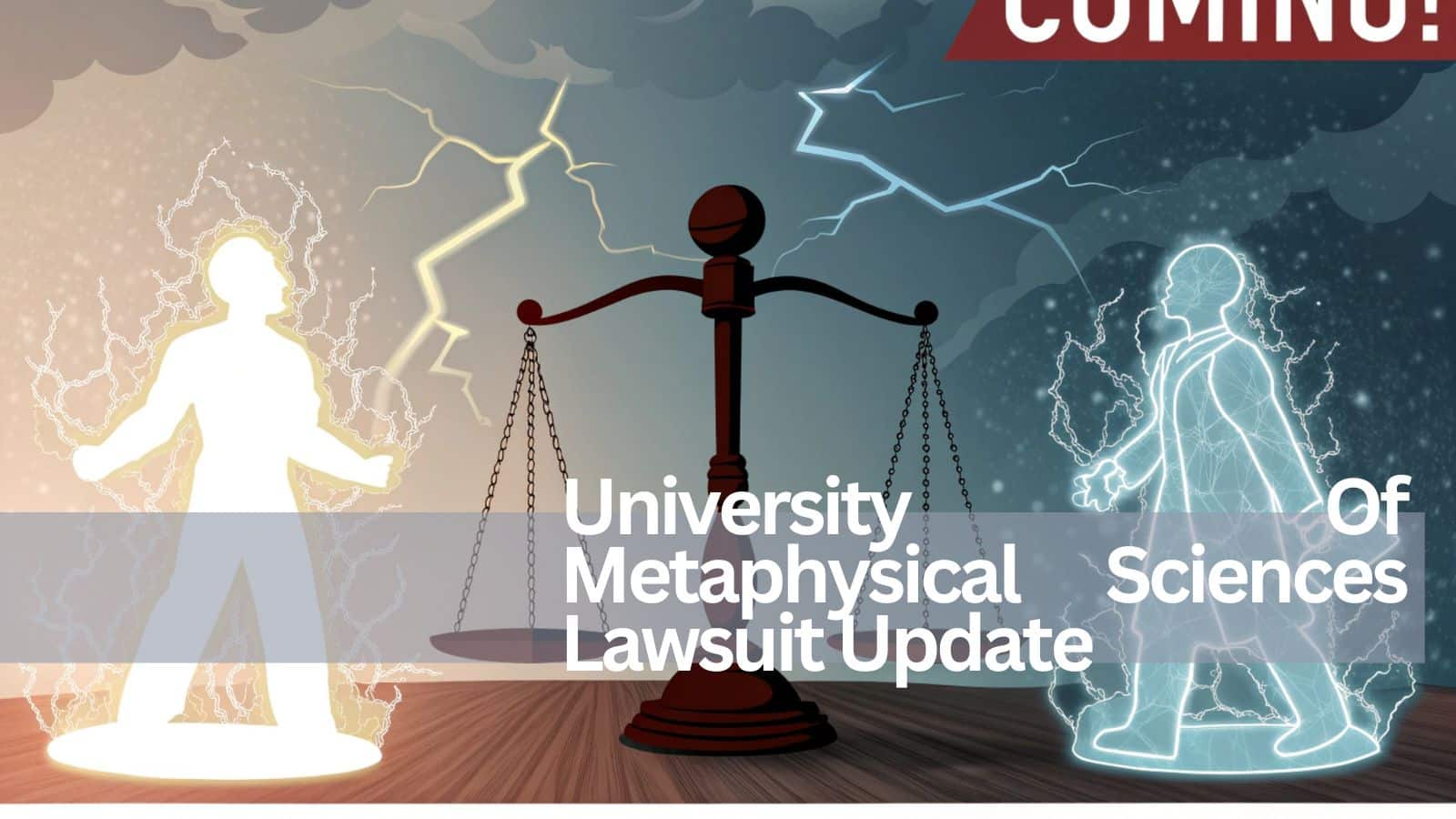Legal battles between businesses can be confusing and overwhelming, especially when misinformation spreads online. I never imagined I would find myself deeply invested in a lawsuit involving a spiritual education institution, but curiosity—and personal experiences—led me down this unexpected path.
As someone who has been interested in metaphysical studies for years, I had considered enrolling at the University of Metaphysical Sciences (UMS). However, as I was researching the institution, I stumbled upon numerous lawsuit updates and conflicting information.
This article is not just about the University of Metaphysical Sciences lawsuit update; it’s about my personal journey of discovery through this case. I want to share what I learned—the facts, the misconceptions, and the impact on students and the school itself.
What is the University of Metaphysical Sciences Lawsuit About?
The University of Metaphysical Sciences (UMS) lawsuit began in 2017, with a competitor filing three lawsuits over alleged false advertising. The latest trial is scheduled for June 2025. UMS claims these lawsuits are frivolous and intended to damage their reputation while draining financial resources.
The main accusation involves Google ads allegedly misleading students, but UMS denies running such ads, citing Google AdWords reports as proof. As a digital marketing professional, I found this case particularly interesting, as competitor-run ads can sometimes create false allegations.
The Impact on Students and Faculty:
While lawsuits between businesses are not uncommon, what struck me about this case was its potential impact on students. Many prospective students, like myself, have been left feeling uncertain about enrolling due to the negative press surrounding the lawsuit.
I spoke to a few current and former students to get their perspectives. Here’s what I learned:
- Confusion About Accreditation: Some students initially worried that the lawsuit was about UMS’s accreditation status, but it turns out this was never a part of the case. The institution remains in good standing.
- No Student Complaints: Unlike some lawsuits against schools, this case has nothing to do with student dissatisfaction, tuition refunds, or academic issues—it’s purely a corporate dispute.
- Increased Support for UMS: Several students told me that seeing the school fight back against unfair legal attacks made them more loyal to UMS, rather than turning them away.
One former student, Sarah, told me:
“I was initially hesitant to enroll because of all the lawsuit updates I saw online. But after researching, I realized it had nothing to do with the quality of education at UMS. I don’t regret my decision.”
For faculty members, this lawsuit has also been frustrating. A professor, who wished to remain anonymous, expressed:
“We are here to teach and guide students, not to deal with ongoing legal battles. The competitor filing these lawsuits is only creating unnecessary distractions for everyone.”
Also read: Rockford Mesothelioma Lawyer Vimeo – Get The Best Legal Help Now!
Predatory Litigation – A Growing Problem!
One term that kept coming up in my research was “predatory litigation.” This refers to businesses using the legal system to attack competitors, not because they have a strong case, but because they want to:
- Drain financial resources of their rival
- Damage their reputation through negative publicity
- Create fear and uncertainty among potential customers/students
UMS claims that this is exactly what’s happening in their case. The competitor has already spent over $1.5 million in tuition funds on legal battles and could reach $2 million if UMS wins its legal fees.
As someone who has followed business disputes before, this case reminded me of similar corporate lawsuits in other industries. Predatory litigation is not uncommon, and businesses often use it to gain an edge over their competitors.
The History of the University of Metaphysical Sciences Lawsuit:
First Lawsuit :
The initial 2017 lawsuit was filed by International Metaphysical Ministry, accusing UMS of false advertising. The case was dismissed due to insufficient evidence, establishing UMS’s compliance with marketing regulations. This early victory demonstrated the weakness of the competitor’s claims, though it marked the beginning of a prolonged legal strategy aimed at draining UMS’s resources through persistent litigation.
Second Lawsuit:
In 2019, the competitor shifted tactics, alleging UMS manipulated search terms like “Sedona Arizona” to hijack web traffic. UMS successfully disproved these claims using Google AdWords reports, showing no wrongdoing. Despite this clear vindication, the legal harassment continued, revealing a pattern of abusive litigation designed to burden UMS with constant legal defenses and associated costs.
Also read: Do Alec And Kaleb Get Paid For Commercials – Shocking Facts Inside!
Third Lawsuit:
The current case (International Metaphysical Ministry vs. Wisdom of the Heart Church) represents the third legal challenge, with a trial set for June 2025. UMS anticipates not only prevailing but potentially recovering legal fees, which could finally deter future predatory lawsuits. This decisive battle may establish important protections for small institutions facing similar legal harassment tactics.
The Upcoming Trial – What to Expect in June 2025!
The latest lawsuit is set to go to trial from June 16–20, 2025. UMS seems confident in its victory, and they believe that winning this case will finally put an end to the 9-year-long legal battle.
A few key points to look out for in the trial:
- Will the court acknowledge this as predatory litigation?
- Can UMS provide undeniable proof that they never ran misleading ads?
- How will the competitor justify their repeated lawsuits?
If UMS wins, they may recover legal costs and finally put this issue behind them. However, if the competitor appeals, the battle could continue even longer.
What is the University of Metaphysical Sciences Lawsuit About?
By June 2025, the University of Metaphysical Sciences (UMS) lawsuit will reach trial after nearly nine years of legal battles. A competitor will continue pursuing false advertising claims, despite previous unsuccessful attempts. UMS is expected to argue that these lawsuits are frivolous and intended to damage their reputation.
The case will likely focus on allegations of misleading Google ads, which UMS plans to refute with Google AdWords reports. As legal proceedings unfold, the court may determine whether this is a case of predatory litigation or genuine advertising misconduct.
FAQS:
1. Why has the University of Metaphysical Sciences been involved in multiple lawsuits?
Since 2017, a competitor has filed three lawsuits against UMS, claiming false advertising. UMS argues that these lawsuits are frivolous and intended to damage their reputation, as previous cases failed to prove wrongdoing. The latest trial is scheduled for June 2025.
2. How has UMS responded to the lawsuit allegations?
UMS denies all allegations, stating they have Google AdWords records proving they never ran misleading ads. They claim the lawsuits are predatory litigation, meant to drain their resources and mislead potential students. UMS remains confident about winning the upcoming trial.
3. Will the outcome of the lawsuit affect UMS students or faculty?
No, the lawsuit does not involve student complaints, tuition issues, or accreditation problems. UMS continues normal operations, with courses and faculty unaffected. Regardless of the verdict, students and staff will experience no disruption in their studies or professional responsibilities.
4. What makes this lawsuit different from other legal disputes in education?
Unlike typical lawsuits involving student dissatisfaction or regulatory violations, this case is centered on business competition. UMS believes their competitor is misusing the legal system to disrupt their growth and mislead prospective students through negative publicity.
5. What can be expected from the June 2025 trial?
The trial will determine whether UMS engaged in misleading advertising or was falsely accused. UMS plans to present digital marketing evidence to prove their innocence. If they win, they may recover legal fees, possibly ending this nine-year legal battle.
Conclusion:
The University of Metaphysical Sciences lawsuit highlights how legal battles can be used as a competitive weapon rather than a means of seeking justice. Over the past nine years, UMS has faced three lawsuits from the same competitor, with previous cases failing to prove any wrongdoing. The June 2025 trial could be a turning point, in deciding whether these claims are frivolous or valid.
Despite ongoing legal challenges, UMS continues to operate without disruption, maintaining its accreditation and student support. A court victory could finally end legal harassment and set a precedent against predatory litigation in the education sector.










